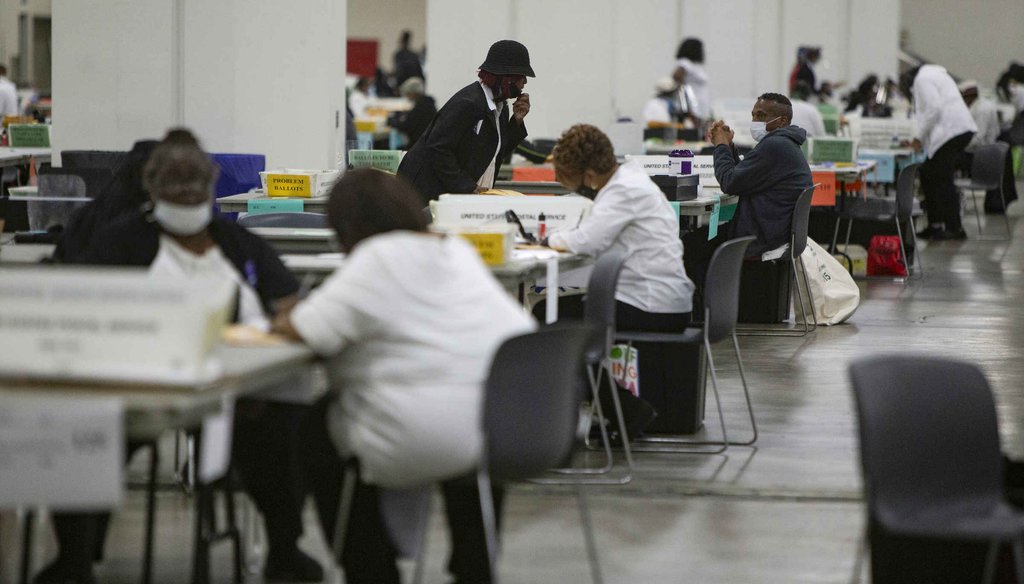Stand up for the facts!
Our only agenda is to publish the truth so you can be an informed participant in democracy.
We need your help.
I would like to contribute

Detroit election workers count absentee ballots cast in the primary election on Aug. 4, 2020, at the TCF Center in Detroit. (Mandi Wright, Detroit Free Press)
If Your Time is short
-
The Wayne County Board of Canvassers found that in nearly three-quarters of Detroit precincts, the number of absentee ballots counted did not match the number recorded in the precinct’s poll book, which tracks the number of voters who cast an absentee ballot.
-
The main processing errors included inconsistently updated voter files and ballots from multiple precincts mixed in ballot containers.
-
The discrepancies point to changes needed ahead of November’s election.
The Michigan Board of State Canvassers pushed for a state takeover of Detroit’s elections after the Wayne County Board of Canvassers identified a number of problems with processing absentee ballots cast by Detroit voters in the August primary.
In 363 out of the city’s 503 precincts — roughly 72% — the number of absentee ballots counted did not match the number recorded in the precinct’s poll book, a compilation of a given precinct’s registered voter records that should indicate the number of voters in a precinct who voted absentee. This was not the first time Detroit has drawn attention for concerns over counting.
Some national conservative websites highlighted the problems in Detroit, writing "there was chaos while counting absentee ballots on primary election night" and asking, "are they math-challenged in Detroit?"
The Wayne County Board of Canvassers, which certifies the election results for Detroit and other jurisdictions in the county, recently passed a resolution asking the state to investigate what went wrong in Detroit.
"After 20 hours of working, was there a human error or was there an intentional mistake?" asked Monica Palmer, the Republican chairperson of the Wayne County board. "I don’t know. I wasn’t there."
Sign up for PolitiFact texts
But Jonathan Kinloch, the vice chairperson, said the board "saw no evidence of individuals voting who were not supposed to."
How were absentee votes counted on Election Day in Detroit?
Absentee ballots, just like in-person ballots, are tabulated at the precinct level. In the August primary, a majority of Detroit voters cast their vote absentee rather than in person.
The city created 134 absent-voter counting boards charged with processing and counting ballots for its 503 precincts, beginning on Election Day. Before any ballots are in the hands of the counting board, the clerk’s office is supposed to record the number of absentee ballot envelopes returned.
Upon receipt of a voter’s returned absentee ballot envelope, the clerk’s office updates that person’s voter record. The change is also supposed to be reflected in the precinct’s poll book, which shows the number of absentee ballots cast by voters in the precinct.
But these updates were not made consistently in Detroit. Failing to record absent voter ballot envelopes as they come in "starts you off on a rough foot to get an accurate count," said Palmer.
When the absent voter counting boards gathered on Election Day at TCF Center, the city’s main convention hall, to begin processing and counting ballots, they may have been working off a precinct poll book that misreported the number of absentee ballots cast in a particular precinct. That’s one possible reason why the number of absentee ballots counted by the tabulation machine may not have matched the number of absentee ballots recorded in the precinct’s poll book. The Wayne County board also found ballots in the wrong precinct container, which also contributed to the errors.
Discrepancies do occur
After all the absentee ballots have been counted, three numbers should match: the number of absentee ballots recorded in the precinct’s poll book, the number of absentee ballots from a precinct tabulated in the counting machine and the number of counted ballots held in the precinct’s ballot container.
It is not uncommon for there to be discrepancies between these three numbers. A ballot may have been jammed in the machine, a ballot envelope may have lacked a signature, a spoiled ballot may have been accidentally tabulated or a voter may have spoiled their ballot and voted in person instead. There are a number of reasons that can explain the discrepancies, and they’re supposed to be recorded in the poll book.
The problem in Detroit was that its absent voter counting boards were unable to identify the source of the inconsistencies. Given the inaccuracies in the number of absentee votes recorded in the poll books and the fact that ballots from some precincts were placed in the wrong container, it was impossible to work backwards and figure out why there was an imbalance.
Under Michigan election law, a precinct that is not in "balance" is disqualified from participating in a recount, and the election results originally reported by the precinct stand as final.
"It doesn’t make any sense, because if you’re trying to identify fraud, you want to get into that ballot container and start tabulating," said Kinloch, the Wayne County board vice chairperson.
Palmer, the chairperson, says the chances for a recount following the November general election are high and worries similar errors could occur in Detroit, disqualifying precincts from a recount. "That disenfranchises the voters," she said.
Looking to November
While the Michigan Board of Canvassers has asked the state to run Detroit’s election this November, Jonathan Brater, the director of the Michigan Bureau of Elections says that won’t happen. "Logistically, practically, it's not possible," Brater said.
But the state is planning to play a more active role to help the city train and recruit absent-voter counting boards and ensure poll books are updated each time an absentee ballot is received by the clerk.
"For any type of error to occur in November would just be unimaginable — the type of focus it would bring down on Michigan, in particular Detroit," said Kinloch.
Palmer agreed: "We cannot go into November repeating what happened in the primary. It absolutely cannot happen."
Our Sources
Wayne County Board of Canvassers, "August 4, 2020 Canvass Report," accessed August 26, 2020
The Detroit Free Press, Dave Boucher, "Michigan board vote may mandate future state takeover of Detroit elections," August 24, 2020
The Detroit Free Press, Kathleen Gray, "State audit: No evidence of fraud in Detroit vote," February 9, 2017
Breitbart, Kyle Olson, "Detroit Absentee Ballot Chaos: 'So Inaccurate We Can't Even Attempt to Make Right," August 23, 2020
PJ Media, Rick Moran, "Officials Say 72 Percent of Detroit's Absentee Voting Precincts Don't Match Official Count," August 23, 2020
Jonathan Kinloch, Vice-Chairperson Wayne County Board of Canvassers, phone interview, August 26, 2020
Monica Palmer, Chairperson Wayne County Board of Canvassers, phone interview, August 26, 2020


















































